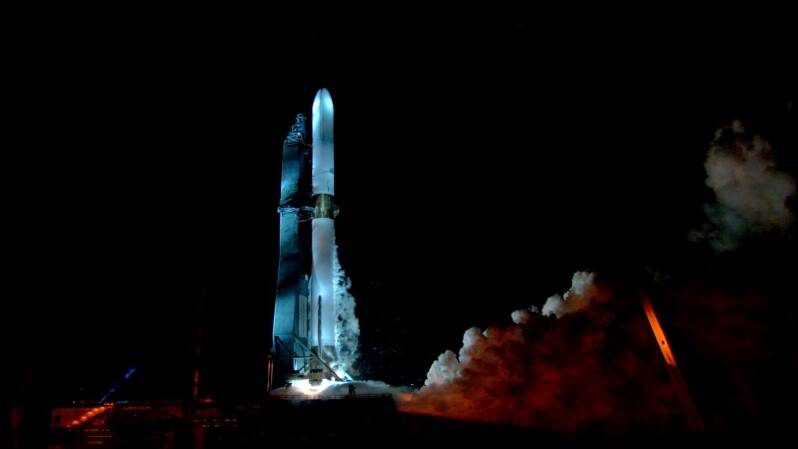Blue Origin, the private aerospace company founded by billionaire Jeff Bezos, is poised to enter the competitive heavy-lift booster market with the long-awaited debut of its New Glenn rocket. The inaugural flight, known as NG-1, is expected to take place as early as Monday, Jan. 6, from Space Launch Complex 36 at Cape Canaveral Space Force Station in Florida. While the exact launch time remains unconfirmed, an FAA advisory suggests a launch window opening at 1 a.m. EST (0600 GMT) and extending to 4:45 a.m. EST (0945 GMT), with backup opportunities daily through Jan. 12.

Credit: Blue Origin
Years in the Making
First announced in 2016, the New Glenn rocket represents years of development and testing by Blue Origin. Following a successful first-stage hot-fire test on Dec. 27, the company is ready to test the rocket’s capabilities in an ambitious mission that includes both a test flight and an attempt to land its first stage on a drone ship in the Atlantic Ocean.
Blue Origin CEO Dave Limp confirmed the progress on social media, stating, “Well, all we have left to do is mate our encapsulated payload … and then LAUNCH!” Bezos also chimed in with enthusiasm, writing, “Next Stop launch.”
A Heavy-Lift Contender
The New Glenn rocket is a heavy-lift reusable vehicle designed to compete with SpaceX’s Falcon 9, Falcon Heavy, and Starship rockets. Its first stage is engineered to return to Earth for ocean platform landings, a feature that aligns with Blue Origin’s sustainability goals. The company claims that each New Glenn booster is capable of flying up to 25 missions.
With a 23-foot (7-meter) payload fairing, the New Glenn can accommodate more than twice the volume of smaller rockets with 15-foot (5-meter) fairings, providing customers with greater flexibility for packaging their payloads. The rocket is designed to carry up to 45 metric tons to low Earth orbit (LEO) and 13 metric tons to geostationary orbit (GEO).
Mission Details
The NG-1 mission will not carry an operational payload. Instead, it will launch the Blue Ring Pathfinder, a 45,000-pound (20,411-kilogram) simulator designed to mimic the company’s future Blue Ring spacecraft. The Pathfinder includes a communications array, power systems, a flight computer, and telemetry equipment. It will serve to validate Blue Origin’s in-space communication and tracking capabilities, paving the way for future missions.
According to Blue Origin, the mission will last approximately six hours, from launch to landing and mission completion.
Landing Attempts and Reusability Goals
The first stage of the New Glenn rocket, named "So You’re Telling Me There’s a Chance", will attempt to land on Blue Origin’s drone ship Jacklyn, which was named in honor of Bezos’ mother. Images of the ship departing for its ocean station were shared by spaceflight photographer John Kraus on social media.
If successful, this landing will demonstrate New Glenn’s reusability, a critical milestone in Blue Origin’s effort to establish a reliable and cost-effective heavy-lift launch system.
Future Implications and Contracts
The NG-1 mission is a significant step toward certifying New Glenn for the U.S. Space Force’s National Security Space Launch (NSSL) program. Blue Origin already has several high-profile launch agreements, including missions for:
NASA: Launching the agency’s ESCAPADE Mars probes.
Amazon: Deploying Kuiper internet satellites.
AST SpaceMobile: Supporting space-to-phone communication services.
These contracts underscore New Glenn’s potential to become a key player in commercial and government spaceflight.
Blue Origin’s foray into the heavy-lift rocket market signals a transformative moment for the company. If the NG-1 mission succeeds, it will cement New Glenn’s position as a viable competitor in the commercial spaceflight industry, joining SpaceX and other players in shaping the future of space exploration and commerce.
For now, all eyes are on Cape Canaveral as Blue Origin prepares to make history with the first flight of its groundbreaking New Glenn rocket.


Add comment
Comments